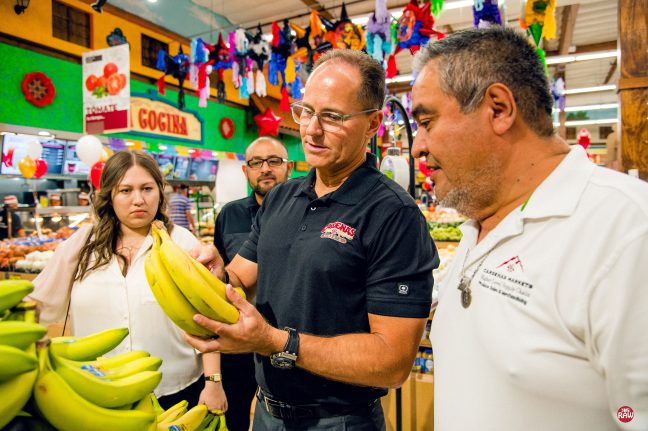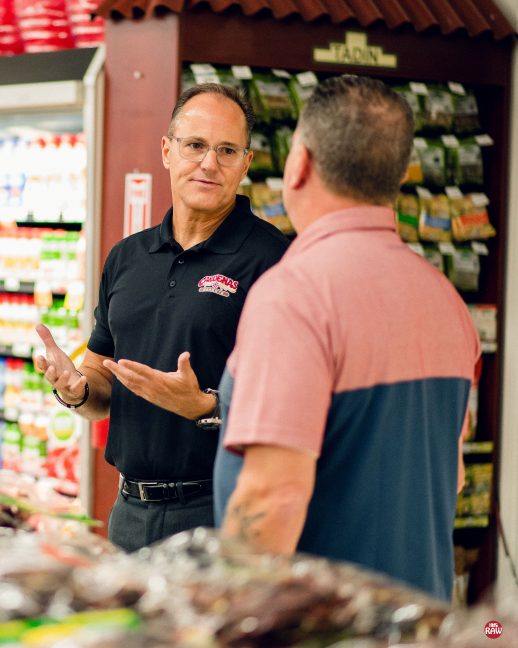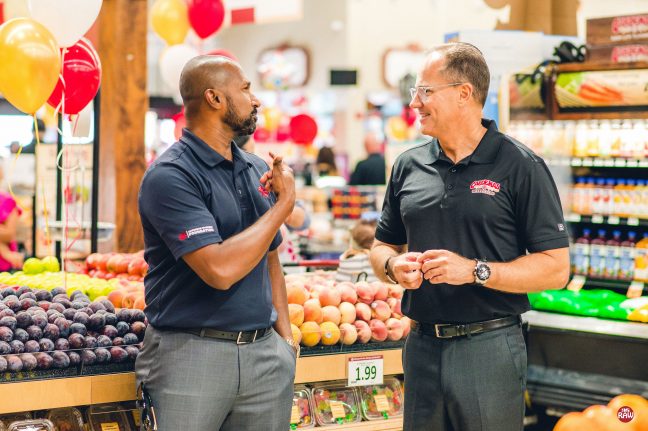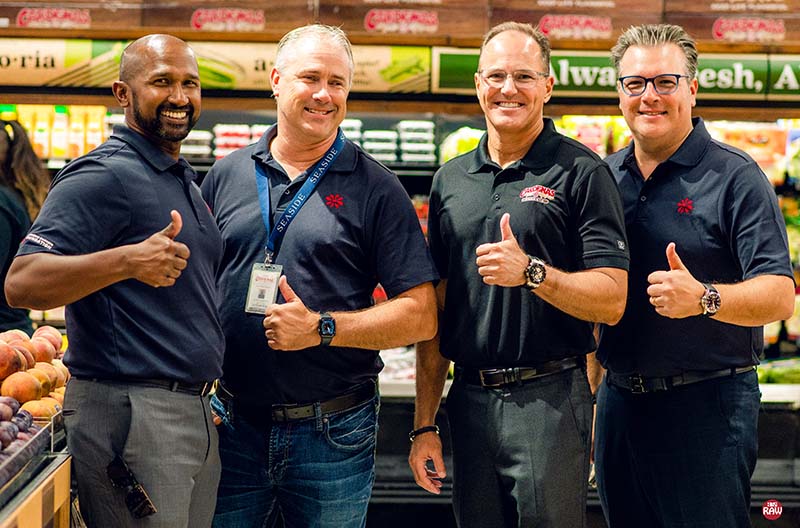Doug Sanders was raised in the East Texas town of Nacogdoches, which sits two hours north of Houston and three hours southeast of Dallas. Sanders grew up spending summers working on his grandparents’ farm.
Now in his 38th year in the grocery industry, he finds himself serving as chairman and CEO of California-based Cardenas Markets, The Shelby Report of the West’s Innovator of the Year. He also is a 2022 inductee into The Food Industry Hall of Fame.
The company earned its honor based largely on its growth and success since Sanders took the helm as CEO in July 2020, during the throes of the COVID-19 pandemic. Prior to assuming the role of CEO at Cardenas, he joined the company’s board of directors in 2018. He had previously served as CEO of Sprouts Farmers Market and his career also includes stints in technology and with other grocers.

In his two-plus years with Cardenas, Sanders has since overseen major deals, merged three different businesses, dealt with a major cyber security incident and played an instrumental role in the company’s acquisition by New York City-based Apollo Funds.
But Sanders’ hall of fame pedigree really has its roots in Texas. He got his first job in grocery the day he turned 16 working as a bagger for Brookshire Brothers.
“They had two stores in my hometown. I started working there in high school and all through college,” he said. “For me, it was something I just gravitated toward. I really enjoyed the business. I enjoyed the customers. Especially being from a small town, you knew the vast majority of the customers when they came in to shop.”
Sanders’ connection with the people of his hometown sparked his interest in the grocery industry. He found himself volunteering to come in on days off and worked in every department within that original store because of his desire to learn.
Sanders worked for Brookshire Brothers from 1986-97. Between that time, he worked his way up to store manager. By 1995, he had moved into the company’s corporate office in Lufkin, Texas.
Sanders began to work in the retail systems department, which he described as a precursor to information technology. At the time, cash registers were the only technology within grocery stores.
Sanders’ first project after joining the department was to replace all the POS in the stores. This project led to him working on a number of technology projects across the company in the years that followed.
“I didn’t necessarily have an IT background,” he said. “I was learning the systems as they were being implemented. I was also taking continuing education courses with Microsoft so I could get ahead of where we were going.”
Sanders left Brookshire Brothers after being recruited to Associated Wholesale Grocers in Oklahoma City. While there, he worked with independent retailers across most of Oklahoma and parts of the Texas Panhandle for the wholesaler.
He said he enjoyed his time at AWG as they were “very customer focused.” In fact, he keeps in touch with many former clients and still receives a Christmas card from some.
“AWG was an absolutely wonderful company and I really enjoyed working for them. I was there for three years, went through the whole Y2K event,” he said. “That kept me busy for a couple of years, as we were implementing and upgrading systems in almost every department in the store.”
In 2000, Sanders took his grocery career in a slightly different direction, joining Arizona-based TCI Solutions, which designed inventory and pricing management tools for grocers. The company had both domestic and international clients, so Sanders spent two years traveling the U.S. and abroad working with food retailers of all sizes. This experience not only expanded his knowledge of the IT industry but also helped him connect with clients who were active in the grocery industry.
“I was recruited by TCI because I had both an IT and a grocery background,” he said. “I was able to sit with senior executives and talk about our technology and how it benefited their business. But could also work with the technology team to explain how our technology works within their IT environment.”
This job is also how he was introduced to the founders of Sprouts Farmers Market.

“I was working on a project for Winn Dixie when I received a phone call from Shon Boney, one of the founders of Sprouts, asking if I could help set up the systems for their new grocery concept.”
In February 2002, Sanders flew out to Phoenix to begin pulling together Sprouts product database and implementing their systems. A week before the first store opened, they offered him the role of VP of information technology, which he accepted.
Sanders eventually rose to become president of Sprouts in 2005, leading the company through many years of dynamic growth, including multiple acquisitions and a successful IPO in 2013. He said that it was one of the most “challenging and rewarding” times of his career.
“I had never worked for a startup, but it was right up my alley. I love to work. I love to move fast. I love working with passionate and dedicated people. And I had an amazing team at Sprouts,” he said.
While Sanders studied business at Stephen F. Austin State University, he said, “To me, nothing replaces hands-on education.”
That hands-on education continued as he grew as a leader. He wore many hats in the early days of Sprouts, so he was accustomed to getting things done himself. But as the company grew, his leadership style evolved as his role became more strategic in nature, delegating much of the day-to-day responsibilities to his executive team.
“As a company grows, you just can’t keep your hands around it all the time. You have to learn to give good direction and manage through people. You hire the right people and put them in the right place with the right level of autonomy and empowerment to get their job done.”
This management style was guided by his friend and mentor Boney, one of Sprouts’ founders. Boney and Sanders came from different worlds but found common ground in their unwavering belief in people.
“He was the one who fostered the culture and vision for Sprouts. This set the tone for believing in what we were doing and getting people to believe in it as well,” Sanders said. “Treat people well, give them good direction and let them do their job. And most importantly, let them know it’s OK to mess up.
“Shon was always astonishing me. He just had such a belief in what we were doing.”
Sanders shared that his time at Sprouts included one of the most regrettable moments of his career. During the opening ceremony for Sprouts’ first store in Texas, somebody noticed that the Texas flag had been raised upside down on the flagpole.
“I have never been more embarrassed. People who I knew that lived in Dallas came to this event. When people found out that I was from Texas, it was even worse,” Sanders said with a chuckle. “We put the flag upside down. Who does that? Especially if you’re from Texas.”
Sanders eventually stepped away from the CEO position at Sprouts in 2016 but continued to serve as the company’s chairman of the board.
“The board was very supportive of what I was doing, but I had to step away. Quite frankly, after years of running hard and building Sprouts from one store to around 300 when I stepped down as CEO, it was time for a break.”
Sanders took some time to himself and to enjoy his family but soon was itching to get back into the grocery business. Through a connection made while at Sprouts, he was offered a position on the board of Cardenas Markets.
“The board was mainly comprised of individuals with private equity background, and they needed a grocery operator on the board,” Sanders explained.
He joined the board at the end of 2018, when Cardenas was still a small family-run business. That changed in a flash as Mi Pueblo of northern California and Ranch Markets of Phoenix, Arizona, became part of the Cardenas banner.
“We went from a small company to a mid-sized company seemingly overnight,” Sanders said.
The sheer complexity of operating in four different markets in three different states with different competitors in every single market can be difficult to manage.
“For me, it was very intriguing because I saw the opportunity to rebuild this company from a small family-owned business into a billion-dollar company,” he said.
Citing his time at Sprouts, Sanders said he was “used to that because change was happening every day there.”
“We were a different company. The last year I was [at Sprouts], I think we opened around 30 new stores. We were perpetually changing and evolving. That’s kind of the same thing we have here at Cardenas,” he said.

Sanders became CEO of Cardenas in July 2020. Undaunted by the unprecedented upheaval caused by the pandemic, Sanders instead marveled at the resiliency he saw at the company. Under his leadership, Cardenas began to invest tremendously in technology, rebuilding the senior executive team and culture.
“The company’s doing great today,” he said.
Alongside this, Sanders has continued to rebuild the private label program at Cardenas. He plans to continue the company’s brand through what the grocer is known for – authenticity. The retailer is innovating its recipes, ingredients and how it relates to the consumer.
Cardenas is a Hispanic-oriented retailer, but its private label needs to consider other demographics as its stores serve a variety of markets.
“While our core customers are primarily Hispanic, we need to understand the generational nuances of the Hispanic consumer and continue to evolve with them,” Sanders said.
“Every market we’re in is a melting pot of generational structure with a variety of ethnic backgrounds that really determines our offerings.”
Use of technology and data has been another characteristic Sanders has prioritized. The grocer has implemented automated product forecasting and replenishment in stores. That evolution began in the center store and is now migrating into other departments.
On a larger scale, technology has helped keep Cardenas going the right direction, Sanders said. The company recently began using an app platform called WorkJam that sends updates and relevant company-wide information to employees.
“How we communicate is one of the biggest challenges especially as we grow. We now leverage WorkJam to share pertinent and widespread internal facing communications,” he said.
As an example, Sanders noted how at the time of the interview Cardenas Markets was going through its open enrollment period for health insurance.
“All the notifications are sent through the app for open enrollment. Ensuring broad-based communication effectively reached its intended audience was difficult prior to using WorkJam. This technological solution has greatly improved our internal communication process,” he said.
As Sanders continues to balance work and enjoying the outdoors and life, he said the most important aspect he can bring to Cardenas is fostering healthy living and a career mentality.
“When you start with us, we want it to be a career,” he said. “When I started in the grocery business, I quickly knew I wanted this to be my career. I think creating those opportunities is important by creating upward mobility within the organization.”
For more information about the company, visit cardenasmarkets.com.
To read the full Innovator of the Year section on Cardenas Markets from The Shelby Report, click here.

